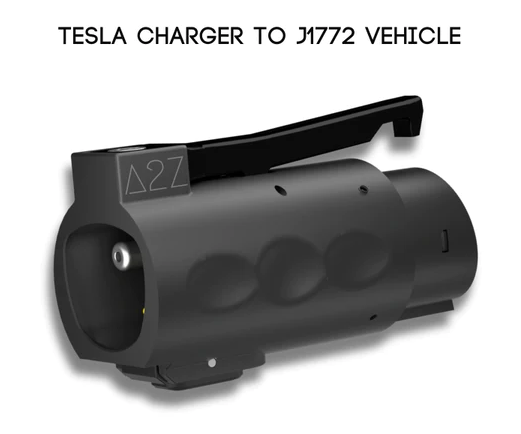I have one of these J3400 to J1772 adapters so I can connect my Hyundai to a Tesla destination charger. They’ll probably get more popular as J3400 becomes the primary standard:

I’m curious what would actually happen if someone were to use such an adapter with a J3400 DC fast charger. I know it can’t possibly work because the DC charging pins are connected to the vehicle’s AC pins, but is there something in the J3400 standard to notice and reject such an adapter before DC voltage is applied?
I’m not sure if J1772 vs. CCS1 adapters contain anything that the signalling protocol could use to identify which is which. If the DC charger were required to passively measure the battery voltage before sending any power, that would probably avoid the “magic smoke” problem, but does the standard guarantee that this will happen?
If I understand it correctly, J3400 requires bidirectional data link with the car before connecting DC current. J1772 is a simpler pilot voltage/resistance value across the two signal pins, which the DC charger won’t recognize. So, nothing would happen if you plugged that adapter into a DC charger.
How would the J1772 adapter force the vehicle or charger to speak the J1772 protocol? Both ends support the CCS protocol and the adapter is presumably passive.
That’s a good question. There will have to be something to prevent DC from being applied to the j1772 pins when using the wrong adapter.
I haven’t seen any technical info on how the DC adapters will work. I’m just guessing, but I would assume that the DC adapters will be active and take part in the handshake between car and charger. If you try to use a passive adapter, one side or the other would determine that the DC pins are not physically connected and refuse the handshake.
So, magic!
They should have a literal rating for Level 1, 2 or 3 charging when you buy it. MOST of these only handle level 2 charging at 80A. I highly doubt there’s many if any that can do Level 3 and not cause magic smoke to appear, but I could be wrong as I haven’t looked at them since I bought a SyncWire adapter for Level2 charging at Tesla stations.
They should have a literal rating for Level 1, 2 or 3 charging when you buy it
It doesn’t really work that way.
The only difference between level 1 and 2 is voltage. 200+ is level 2, and at the amounts we’re talking about, it doesn’t matter. The wiring/adapter cares about amperage far more than voltage. As another example, a 240V circuit at home uses the same wiring as 120V, assuming the amperage is the same; the only difference is how it’s connected in the panel.
However, there should be (and is!) rating for amperage. I’ve seen plenty of 40A adapters out there, which would be a problem if you use them on a 48+ amp power source with a car that can use it. The adapter doesn’t de-rate anything.
As for level 3, that’s kinda like your mom calling a Sega Genesis “Nintendo” - everyone knows that you mean but it’s not technically correct. Really it’s called DC fast charge, because rather than converting a relatively small amount of AC into DC in your car, a much bigger transformer is part of the charger setup and that power goes pretty much straight to the battery. In a CCS plug, it’s in those two extra pins below the J1772. As mentioned elsewhere, it uses a much different protocol to communicate with the car so it wouldn’t initiate power if it’s not made for it.
What I’m still unsure about is if the upcoming adapters will support a NACS plug on an AC or DC circuit. If I can use the same adapter at a hotel or on a road trip, that would be neat! But it would still be a bit different than “rating” levels 1, 2, or 3.
if the upcoming adapters will support a NACS plug on an AC or DC circuit
The NACS to CCS1 adapters I’ve seen are DC only. An AC/DC adapter would somehow need to detect what kind of charger is connected and switch to the correct pins. Relays capable of switching 500+ amps are $$$.
it uses a much different protocol to communicate with the car so it wouldn’t initiate power if it’s not made for it
You say “it wouldn’t initiate power”, but how does the DC charger know if you’re using an AC adapter?


